- Home
- Christina Lauren
The House Page 2
The House Read online
Page 2
Gavin had always been her classmate, but she’d never really noticed him before that day. For as much as he looked other—like he’d stepped straight out of the movie from the day before—he’d mastered the ability to vanish in a crowd.
She was sent away right at the strange, obsessive peak of her fascination—after she’d watched him for two years, after she’d decided to ask him to the first girl-boy dance at school. But at recess, instead of finding him reading under a tree like usual, she’d found him limply ricocheting between two bullies on the playground. Delilah had kicked Ethan Pinorelli in the shin, punched James Towne in the jaw, received a reflexive shove to the face, and promptly been expelled.
Horrified, her parents had sent her to live and attend private school near Delilah’s eccentric grandmother. But far from the strict Catholic school Delilah’s parents had hoped for, Saint Ben’s was the key that had unlocked Delilah’s imagination.
The distance might have also muted her crush over the years, but Delilah found she could hardly stop watching Gavin now.
“What are you staring at?” Dhaval asked, nudging her shoulder and bringing her out of her thoughts.
She swallowed a bite of apple and lifted her chin toward where now-teenage Gavin sat beneath a tree, reading alone.
Dhaval snorted. “You’ve been locked up too long in the school full of girls if you think that’s the best you can do.”
Shaking her head, Delilah insisted, “No, look at him.”
“I’m looking.”
“He’s so tall now. . . and long.” Gavin had always been that way, long and gangly with joints that seemed to be too big for the parts they connected. Now his skyscraper legs fit his huge feet, and his arms were a perfect match for the torso that kept going and going. Gavin was all grown up, and looking like he had a million secrets: He was Delilah’s form of kryptonite.
Beside her, Dhaval hummed in neutral agreement.
“And he’s not that skinny anymore,” she added. “He’s actually kind of muscular.” Even Delilah heard the way her voice shaped that word—“muscular”—like it was a little dirty.
“If you say so.”
“And. . .” Delilah trailed off. What could she say? I’ve been sort of obsessively fascinated with him since we were nine, and I’m shocked to find out he’s even better than I expected?
“Didn’t you slip a note in his locker?” Dhaval asked. “Before you were shipped off to Saint Ben’s?”
Delilah nodded, laughing. Apparently, her fascination with Gavin Timothy wasn’t as secret as she’d thought.
“What did it say again?” he asked.
“It said, ‘I don’t want you to hide. I like you.’”
Beside her, Dhaval burst into laughter. “That’s so cheesy, Dee. Also, it’s still true.”
She chewed her fingernail, unable to look away from the shadow of a boy beneath a tree. “I wonder if he ever got it.”
“He did,” Dhaval said through a bite of sandwich. “Then someone—I don’t remember who—took it from him and made a big deal out of it.”
“What do you mean, ‘made a big deal out of it’?”
Dhaval waved his hand dismissively. “Like, read it in front of a group of kids on the playground, made kissy noises, whatever.”
“What did Gavin do?”
“I think he laughed along for a minute and then asked for the note back.”
Delilah smiled a little. Gavin wanted the note, at least. Sadly, it might be the most romantic thing that had ever happened to her and she was only hearing about it six years later.
She had a thousand questions about life in Morton since she’d left for boarding school. One day Delilah was a sixth grader at Morton Middle School. The next afternoon she was on a plane to Massachusetts. Coming back for a week here, two weeks there was never enough time for her to get back into the rhythm of the small town. Just when she was catching up, it was time to leave. Other than Dhaval, who would have been her friends? Who would have been her first kiss? Who was dating whom?
But now most of her questions were about Gavin. Did he have a girlfriend? Did he still play the piano? And, of course, had Dhaval ever seen a parent, or any grown-up really, near him? It was the biggest mystery of Delilah’s childhood: Gavin had been the one kid without anyone at Back to School Night, or school plays, or even waiting for him at the curb at the end of the day.
Her fascination had always been a mixture of preteen longing and bearlike protectiveness.
“Are you glad to be back?” Dhaval asked, oblivious to her train of thought.
Delilah shrugged. For as nice as it was to see Dhaval and ogle Gavin again, the answer was easily “no.” She’d been unceremoniously shipped away to Saint Benedict’s, but it had become her home far more than the square two-bedroom cookie-cutter stucco house on Sycamore Street ever had. Delilah missed her old school, her friends, and her increasingly senile grandmother, in whose home she spent most of the past several years, as her parents had started to assume that Delilah would rather stay in Massachusetts than come home for a week over spring break, or a week around Thanksgiving or, eventually, for the entire summer. But Nonna was in a nursing home now, entirely lost to dementia, and without Nonna, Delilah’s parents couldn’t afford to keep her in school fifteen hundred miles away.
“Okay, don’t answer that,” Dhaval said, after she had been silent for way too long. “I’m happy to have you back. We need some quirk around here, Dee.”
“I’m happy to see you, too,” she said, leaning into her oldest friend. “And I’m happy to see Gavin all grown up.”
“I bet you are. You little demon.”
Delilah gave Dhaval a wicked grin. But then the bell rang loudly, startling her and signaling the end of the lunch break. When Delilah looked back to the tree, Gavin was already gone. She packed up the remnants of her lunch and followed Dhaval back inside.
By the end of the day, with only tiny glimpses of Gavin after lunch, Delilah’s curiosity got the better of her. What does he do after school? Does he meet up with friends? Does he have a job? The questions grew into a maddening itch inside her mind, and it reminded her of how it felt to lie in bed at Saint Ben’s, trying—but failing—to resist sneaking into the Fine Arts Building.
She followed at a safe distance as he walked away from school, paying the necessary amount of attention to the gardens, her phone, anything to look absorbed in her stroll and definitely not like a stalker, following a boy seventeen blocks home.
It wasn’t that weird, was it? How many times had her girlfriends snuck off grounds to walk past the dorms of the boys at Saint Joseph’s or had Nonna told her about walking past Grandpa’s house when they were kids, just to get a peek inside his living room? It had sounded so innocent when Nonna said it; couldn’t this be the same?
She didn’t even have to follow Gavin, really. She suspected he still lived in the same house, the one they all called the Patchwork House for how it seemed like every part of it came together in a different color and style and shape.
It was on a generous lot, nestled between rows of identical houses but encircled by a tall fence obscuring most of it from view and long since covered in exuberant, violet morning glory that bloomed every day of the year. From the glimpses she’d caught from the sidewalk while trick-or-treating—the only time she’d been allowed to get that close, and the only time the iron gates out front remained open—she knew the front room was all modern glass, the side parlor lined with wood shingles and a cozy bay window. There was a turret on the third floor and a portion with Victorian paint and elaborate embellishments carved out of wood.
Kids used to say the house was haunted, but it never looked that way to Delilah. It was stunning, thriving, like something out of an old story, or an ancient black-and-white movie. Teenagers had always bragged about egging the house on Halloween, but to her knowledge, no one had ever really done it. The house—like most strange things in Morton, including Gavin—was just different enough to make the town
residents want to pretend it wasn’t there at all.
He turned a corner in the distance, and Delilah hung back, stepping behind the trunk of a large elm to watch. She waited for him to approach the fence, and she told herself that as soon as he reached for the latch at the gate, she would turn and walk home.
But it never happened.
Gavin crossed from one side of the street to the other, and the iron gate began to move, creaking open without being touched. The doors swung apart just far enough for him to slip through before closing again with a clang. She never saw him turn, never even saw him touch the gate at all.
Delilah didn’t know what to make of this and stood stock-still, frozen in place behind the old tree. Why would anyone need an automatic gate that wasn’t for a driveway? Had there been some sort of remote in his pocket? But Gavin’s hands hadn’t been in his pockets. His thumbs had been causally tucked beneath the straps of his backpack. If there was a remote, he hadn’t used it.
She crossed the road and stood next to the imposing fence that surrounded the Patchwork House. Peeking through the thick vine there, she saw the same thing happen with the front door: It swung open long before Gavin reached it. And here, too, there wasn’t another person on the other side, just empty darkness to greet him.
She’d planned on going home, but now, walking away from what she’d seen felt impossible. Without giving herself time to think on it, she reached out with the toe of her shoe to check the footing, summoning every bit of courage she had before scrambling up the sturdy vines, lifting her body over the edge, and falling hard onto the lawn on the other side.
After she caught her breath, she took in the view. And what a view it was.
The house looming in front of her bore little resemblance to the house in her memories. In fact, it looked as if someone had taken that house and tacked on two or three others, all of varying styles and from different eras. It was all different colors—deep burgundy, goldenrod, forest green, and cornflower blue—and looked as if it had never borne the brunt of any windstorm, rain, or dust. Upstairs, two stained-glass windows gleamed in the late-afternoon sun, looking just like eyes watching over the street below. One half of the front lawn was emerald green, glistening and lush. Oddly, the other was just as dead as the first was alive, yellowed and brittle. Around the back, apples bloomed ruby red on the trees. In fact, every tree in the yard was plump with spring. . . in the middle of January.
Delilah blinked hard into the light, feeling as though she’d been ripped from her own ordinary existence and dropped into another world, one rich and ripe and bursting with color.
She looked back over her shoulder, convinced she must have fallen through some sort of rabbit hole and she would find herself fast asleep and dreaming on the other side. Did things like this house even exist in real life?
She turned to the sound of his voice from inside, yelling hello, and the thunk of his backpack as it hit the floor. Delilah crept to the nearest side window, peering in. A fire burned with gusto in a deep stone fireplace, and she felt a dizzying wave of relief that someone was there to welcome Gavin home. Maybe cook him some soup, bake him some bread for dinner.
But just as his long figure slipped into her view, the curtains in front of her closed with such violence that for a moment Delilah imagined the entire house had shaken.
Chapter Four
Him
Gavin heard a yelp, the sound of something scratching outside, and ran to the window, fighting with Curtain. “Just let me see!” he shouted, somehow knowing what had just happened.
He saw only the bottom of Delilah’s shoes as she hurled herself over the side fence. Thin coils of vine reached for her feet. He pounded at the window, and the tendrils shrank back, limp and contrite.
He hadn’t confronted her earlier, when he knew she was following him, because he didn’t imagine even fearless Delilah would have the guts to climb the fence. Before he could think better of it, he was out the door, pushing through Gate and chasing her down the street. “Delilah!”
She froze, turning to face him with a blush that could have set his mouth on fire. “I’m sorry! I just. . .” She blinked, shrugging as if she’d lost her words. “I just wanted to know if you still lived here.”
“I do,” he answered, confusion giving way to another feeling entirely when she met his eyes. Hers were green, and she had a dusting of freckles across her nose. He should have been focused on the fact that Delilah absolutely did not belong there. He should feel protectiveness for House welling inside him instead of the odd urge to pull Delilah closer. Nobody had ever dared scale the fence that surrounded House before, and certainly no one had dared to get this close in years. This was completely new territory for Gavin, talking to another person while House silently vibrated behind him.
He doubted Delilah could feel it from where she stood, but he could.
But with her so close, Gavin had to work to keep his attention from her mouth: It was soft and pink, with a top lip as full as the bottom. It was a mouth made for trouble, lips to be caught between teeth. Over the past six years, and with only tiny glimpses of her from afar when she was home over school breaks, he’d imagined how she might be growing up and, recently, that involved some interest in what it might feel like to finally kiss Delilah Blue. Standing here on the sidewalk in front of his house, he was closer to her than he’d ever been.
“Don’t follow me home,” he said as gently as he could. “Please, Delilah, don’t ever follow me home again.”
“I was curious,” she admitted, adding, “Then with the gate. . . I just wanted to know you were okay.” Her jaw had set with a familiar twist of protectiveness.
“Why wouldn’t I be?” Gavin asked, eyes not quite meeting hers.
Delilah shifted her weight to peek at House behind him, as if the question alone might send it rising up from its foundation. “People talk about this place,” she said.
“People talk about you,” he replied.
“People don’t think I’m haunted.”
“Bet you wouldn’t be insulted even if they did.” He hadn’t missed the things she doodled in the margins of her English book.
“No, I wouldn’t.” They stood at an impasse for a moment before she added, “Is it haunted?”
“Do you think it is?” he asked.
“I don’t know,” she said, and he could tell that she really didn’t. “I might not know exactly why it looks the way it does, but I’m not blind, Gavin. Look at it.”
He didn’t need to turn and look at his house; he knew it better than anyone in the world. “I like that you wanted to make sure I’m okay, Delilah. I promise I am. Please, don’t do this again.” That wasn’t at all what he wanted to say, but he knew it was for the best. Delilah couldn’t come this close again, and she definitely couldn’t come inside.
Her eyes narrowed, and for a minute she looked fierce and determined. He couldn’t stop the smile that spread across his face. For a heartbeat, he hoped she would shove him, because it looked like she wanted to, and he’d always wanted to know how such a forceful touch would feel. Delilah looked at him a beat longer and then turned and walked away.
Gavin didn’t know what to expect from Delilah the next day. He’d always known the rumors about his house, how it was haunted, or the site of the gristly murder of his entire family or—his personal favorite—the unofficial headquarters for all of Kansas’s satanic rituals. He didn’t know if anyone actually believed any of the stories, but even if they didn’t, the terrible possibilities kept people away from the place.
Except Delilah. She’d followed him, not turning from the gate like everyone else. And even when Gavin had caught up to her on the sidewalk, she’d looked more embarrassed to have been caught than terrified from having been grabbed by a plant on his fence. She didn’t seem to be scared at all. Did he want her to be?
Gavin had never been particularly good at reading people, and he gave up pretty early on, after inviting a friend over on the weekend an
d watching him run away screaming that the house was full of ghosts. Gavin had endured questions and looks and taunting for a week afterward, but it stopped abruptly after Delilah beat up the two worst bullies on the playground. She was promptly shipped off to Catholic school eight states away. Gavin had been tall and stringy at eleven, all daddy-longlegs limbs with too-long hair and pale skin, odd even to the kindest eye. But after Delilah—the prettiest and toughest girl at school—had stood up for him, the bullying had stopped. People ignored him, sure, but at least they left him alone. He’d wished he had a way to thank her.
So that night, after she’d walked off and left Gavin a little stunned on the sidewalk, he went back inside and found the dusty box in the back of Closet, where he’d stored his old papers and drawings. Buried in the crumpled mess was the note from six years ago, written in the scrawling hand of the wild and protective Delilah.
I don’t want you to hide. I like you.
Gavin read it over and over, trying to puzzle out what it meant to be liked, and if—even then—she meant it a certain way.
He didn’t sleep well and was up before dawn, eating breakfast in the backyard, where it was quieter and he could think in relative peace. He had plenty of thoughts about girls, about their lips and their necks and their hands and all kinds of other parts. But he had never had such fascination with a mind before, because as tiny as she was, Delilah was ferocious. What a pair they must make standing beside each other. Her fire so huge it spilled out of her and onto the pavement. His entire world so small she couldn’t even see it with him looming over her.
• • •
As much as Gavin liked Delilah’s face, he liked sitting behind her in English even more. She didn’t dare turn and look at him the next morning, but he could feel every bit of her attention focused behind her, toward him.

 Love and Other Words
Love and Other Words Autoboyography
Autoboyography Dating You / Hating You
Dating You / Hating You Beautiful Player
Beautiful Player Beautiful Bombshell
Beautiful Bombshell Beautiful Stranger
Beautiful Stranger Beautiful Bastard
Beautiful Bastard Beautiful Secret
Beautiful Secret The Unhoneymooners
The Unhoneymooners Beautiful Beloved
Beautiful Beloved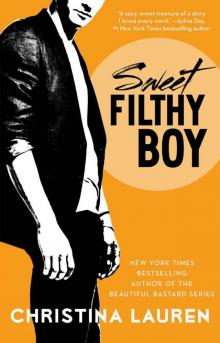 Sweet Filthy Boy
Sweet Filthy Boy Dark Wild Night
Dark Wild Night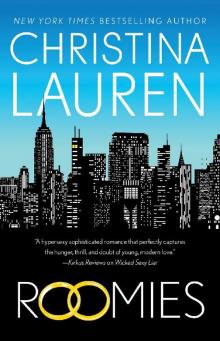 Roomies
Roomies Dirty Rowdy Thing
Dirty Rowdy Thing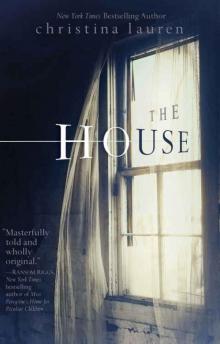 The House
The House Beautiful Bitch
Beautiful Bitch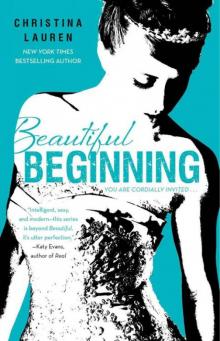 Beautiful Beginning
Beautiful Beginning Josh and Hazel's Guide to Not Dating
Josh and Hazel's Guide to Not Dating Beautiful Boss
Beautiful Boss In a Holidaze
In a Holidaze Wicked Sexy Liar
Wicked Sexy Liar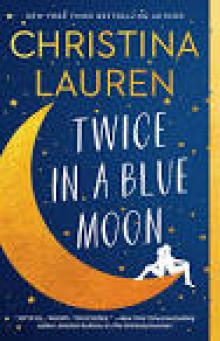 Twice in a Blue Moon
Twice in a Blue Moon Sublime
Sublime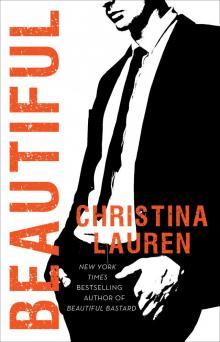 Beautiful
Beautiful Beautiful Boss (Beautiful #9)
Beautiful Boss (Beautiful #9) Wicked Sexy Liar (Wild Seasons #4)
Wicked Sexy Liar (Wild Seasons #4)